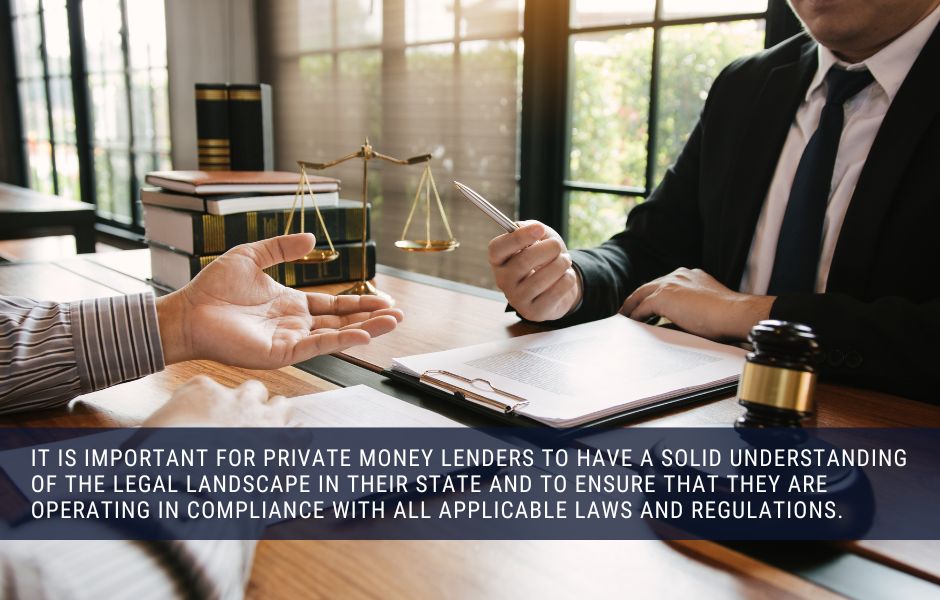Is Private Money Lending Legal?
Investor Bonus: See Investor-Ready Private Lending Deals Every Thursday
Private money lending can be a great way to earn double-digit returns on your money, but there are some legalities to consider that could have serious consequences...

David Garner
Is Private Money Lending Legal?
Private money lending, also known as peer-to-peer lending or marketplace lending, has become an increasingly popular way for borrowers to obtain funding outside of traditional banks and financial institutions.
For investors looking to lend, it can also be a great way to earn monthly income from your investments, while enjoying the capital security of real estate.
However, the legality of private money lending in the United States is a complex issue that varies depending on the state and the specific lending arrangement.
In this article, we will explore the legal landscape of private money lending in the United States, including the regulations that govern the industry and the risks and benefits for both borrowers and lenders.
Don’t Miss Out: Join 5,000+ investors and get exclusive lending investments delivered to your inbox every Thursday
Overview of Private Money Lending
Private money lending is a form of lending in which individuals or groups of individuals provide loans to other individuals or businesses.
In the real estate industry, private money lending allows real estate investors to obtain financing for real estate deals outside of traditional bank loans, often with more favorable terms and faster approval times.
Nowadays, the peer-to-peer lending industry has expanded rapidly to include many kinds of lenders and borrowers funding private and commercial loans for all sorts of purposes.
By and large, the lending is typically done through an online platform or marketplace, which connects borrowers with lenders. The process is typically faster and more streamlined than traditional lending, and borrowers may be able to obtain funding at more competitive rates, or with more flexible terms and more accommodating qualifying criteria.
Several large players such as LendingClub, Prosper, and Funding Circle dominate the market. These platforms have facilitated billions of dollars in loans to private individuals and businesses, and the industry as a whole is expected to continue growing in the coming years.

Regulations Governing Private Money Lending
The regulation of private money lending in the United States is a patchwork of state and federal laws.
At the federal level, private money lenders are subject to regulations from the Consumer Financial Protection Bureau (CFPB), which was created in the wake of the 2008 financial crisis to protect consumers from predatory lending practices. The CFPB has the authority to enforce regulations related to the disclosure of loan terms, the fair treatment of borrowers, and the prevention of unfair, deceptive, or abusive practices.
In addition to federal regulations, private money lending is also subject to state-level regulations, which can vary widely depending on the state. Some states have strict regulations governing private money lending, while others have little or no regulation at all. In general, states with more robust regulations require private money lenders to obtain licenses, disclose loan terms, and adhere to specific guidelines related to interest rates, fees, and repayment schedules.
One example of a state with strict regulations is California, which has enacted the California Financing Law (CFL). The CFL requires private money lenders to obtain a license from the California Department of Business Oversight, and to adhere to specific guidelines related to loan terms and disclosure requirements. The CFL also limits the amount of interest that private money lenders can charge, which is currently set at 10% above the Federal Reserve discount rate.

Don’t Miss Out: Join 5,000+ investors and get exclusive lending investments delivered to your inbox every Thursday
Legal Considerations for Private Money Lending in Real Estate
Private money lending to real estate investors is subject to many of the same state and federal regulations as other types of private lending.
These regulations may include requirements for licensing, disclosure of loan terms, and adherence to guidelines related to interest rates and fees.
One specific consideration for private money lending to real estate investors is the possibility of the loan being classified as a “residential mortgage loan” under the Truth in Lending Act (TILA). This classification may trigger additional legal requirements related to disclosure of loan terms and the ability of borrowers to rescind the loan within a certain timeframe.
In addition, lenders must be aware of state and federal laws related to foreclosure and collection practices, as they may be subject to legal action if they violate these laws.

Risks and Benefits for Borrowers
Private money lending can offer several benefits to borrowers, including faster approval times, more flexible loan terms, and potentially lower interest rates. Borrowers who may not qualify for traditional bank loans may be able to obtain funding through private money lending, and may be able to use the funds for a variety of purposes, including starting a business, consolidating debt, or purchasing a home.
However, there are also several risks associated with borrowing private money…
Borrowers may be subject to higher interest rates and fees than they would be with traditional bank loans, and may also be subject to less favorable loan terms. In addition, private money lenders may not be subject to the same regulatory oversight as traditional banks, which can make it more difficult for borrowers to address disputes or complaints.
One of the primary advantages of private money lending to real estate investors is the ability to obtain financing quickly and with more flexible terms than traditional bank loans. This can be particularly advantageous for real estate investors who need to act quickly to secure a property or make improvements that will increase its value.
In addition, private money lending to real estate investors may allow borrowers to obtain financing for deals that may not be possible through traditional bank loans. This may be particularly true for borrowers with lower credit scores or limited income, who may have difficulty qualifying for bank loans.
As with other types of private money lending, there are also risks associated with private money lending to real estate investors. Borrowers may be subject to higher interest rates and fees than they would be with traditional bank loans, which can make it more difficult to repay the loan.
It is also worth considering that borrowers may be subject to less favorable loan terms, which may make it more difficult to complete the real estate deal successfully. For example, some private money lenders may require that the borrower pay back the loan in full within a short timeframe, which may be difficult to accomplish if the real estate deal takes longer than expected to complete.

Risks and Benefits for Lenders
Private money lending can also offer several benefits to lenders, including potentially higher returns than they would be able to obtain through traditional investments. Lenders may be able to diversify their portfolios by investing in a variety of loans, and may be able to access a broader range of borrowers than they would be able to through traditional investments.
However, there are also several risks associated with private money lending for lenders. Lenders may be subject to the risk of default, which can result in the loss of their investment. In addition, private money lenders may not have the same level of protection as traditional bank lenders, which can make it more difficult for them to recover their investment in the event of default.
Moreover, private money lending is not without legal risks for lenders. In some cases, private money lenders may inadvertently violate state or federal regulations related to lending, which can result in legal action or fines. For this reason, it is important for private money lenders to have a solid understanding of the legal landscape in their state and to ensure that they are operating in compliance with all applicable laws and regulations.
Private money lending to real estate investors can also offer advantages for lenders, particularly in terms of potentially higher returns on their investments. In addition, lenders may be able to diversify their portfolios by investing in a variety of real estate deals, which can help to reduce risk.
In addition, lenders may be able to work directly with borrowers to negotiate loan terms and repayment schedules, which can offer more flexibility than traditional bank loans.
Private money lending to real estate investors can also carry risks for lenders. The primary risk is the possibility of default, which can result in the loss of the lender’s investment. In addition, lenders may be subject to legal action if they violate state or federal laws related to lending, foreclosure, or collection practices.

Don’t Miss Out: Join 5,000+ investors and get exclusive lending investments delivered to your inbox every Thursday
Conclusion
Private money lending has become a popular way for borrowers to obtain funding outside of traditional banks, but the legality of the industry in the United States is a complex issue that varies depending on the state and the specific lending arrangement.
While private money lending can offer benefits to both borrowers and lenders, it is important to be aware of the risks associated with the industry, including potential legal risks and the risk of default.
For borrowers, it is important to carefully review loan terms and to ensure that they understand all associated fees and repayment schedules.
For lenders, it is important to have a solid understanding of the legal landscape in their state and to operate in compliance with all applicable laws and regulations. As the private money lending industry continues to grow in the United States, it will be important for all parties involved to stay informed about the legal and regulatory developments that impact the industry.

Don’t Miss Out: Join 5,000+ investors and get exclusive lending investments delivered to your inbox every Thursday
Private money lending to real estate investors can offer many benefits for both borrowers and lenders, including faster approval times, more flexible loan terms, and potentially higher returns on investment.
However, it is important to be aware of the legal and regulatory considerations associated with this type of lending, as well as the risks and potential downsides. By carefully weighing the benefits and risks, borrowers and lenders can make informed decisions about whether private money lending is the right choice for their specific needs and circumstances.
Private money lending to real estate investors can offer many benefits for both borrowers and lenders, including faster approval times, more flexible loan terms, and potentially higher returns on investment. However, it is important to be aware of the legal and regulatory considerations associated with this type of lending, as well as the risks and potential downsides. By carefully weighing the benefits and risks, borrowers and lenders can make informed decisions about whether private money lending is the right choice for their specific needs and circumstances.
[/fusion_text]


